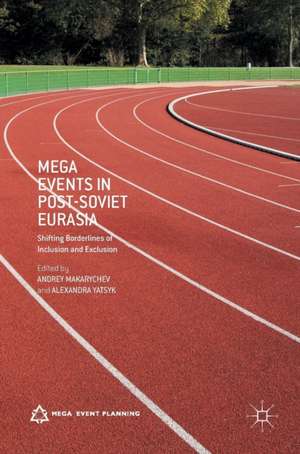Mega Events in Post-Soviet Eurasia: Shifting Borderlines of Inclusion and Exclusion: Mega Event Planning
Editat de Andrey Makarychev, Alexandra Yatsyken Limba Engleză Hardback – 19 iul 2016
Preț: 387.75 lei
Nou
Puncte Express: 582
Preț estimativ în valută:
74.21€ • 77.19$ • 61.26£
74.21€ • 77.19$ • 61.26£
Carte tipărită la comandă
Livrare economică 12-26 aprilie
Preluare comenzi: 021 569.72.76
Specificații
ISBN-13: 9781137490940
ISBN-10: 1137490942
Pagini: 249
Ilustrații: XII, 229 p.
Dimensiuni: 148 x 210 x 19 mm
Greutate: 0.41 kg
Ediția:1st ed. 2016
Editura: Palgrave Macmillan US
Colecția Palgrave Macmillan
Seria Mega Event Planning
Locul publicării:New York, United States
ISBN-10: 1137490942
Pagini: 249
Ilustrații: XII, 229 p.
Dimensiuni: 148 x 210 x 19 mm
Greutate: 0.41 kg
Ediția:1st ed. 2016
Editura: Palgrave Macmillan US
Colecția Palgrave Macmillan
Seria Mega Event Planning
Locul publicării:New York, United States
Cuprins
Introduction - Sports, Politics and Boundaries: Playing the Inclusion - Exclusion Games by Andrey Makarychev and Alexandra Yatsyk .- Part I Mega-Events and Social Issues .- 1. Mega-Events As Agents of State Socialization: Human Rights Protests in Beijing, 2008 and Sochi, 2014 by Richard Arnold .- 2. The 2014 Winter Olympics Bid Book as Site of National Identity Constitution by Philipp Casula .- 3. Vanished in the Haze: White Elephants, Environmental Degradation and Circassian Marginalization in Post-Olympics Sochi by Bo Petersson and Karina Vamling .- Part II Post-Soviet Autocracies and Mega-Events .- 4. Ice Hockey World Championship in Belarus: Political Context by Ryhor Nizhnikau and Niko Alvari .- 5. Kazakhstan and the Global Industry of Mega-events:A Case of Autocratic Management by Adilzhan Nurmakov .- 6. First European Olympic Games in Baku:New Articulation of Azerbaijani Identity? by Anar Valiyev .- Part III Global Norms and Local Governance .- 7.Fiscal framework for mega-events in post-Soviet Eurasia:Shifting the borderline or raising the bar? by Karolina Tetłak .- 8. Regional dimensions of global games:the case of sports mega-events in Tatarstan by Alexandra Yatsyk .- 9. From Sochi – 2014 to FIFA – 2018: The Crisis of Sovereignty and the Challenges of Globalisation by Andrey Makarychev.
Notă biografică
Andrey Makarychev is Professor of Politics and Governance at the University of Tartu, Estonia. He has published on a variety of topics related to Russian foreign policy, including a co-edited volume titled Russia's Changing Economic and Political Regimes (2013), Russia and the EU in a Multipolar World (2014), and a contributing chapter in Russia's Foreign Policy (2015). He has published research articles in major peer-reviewed international journals such as Problems of Post-Communism, Journal of International Relations and Development, Europe-Asia Studies, Journal of Eurasian Studies, Demokratizatsiya, and European Urban and Regional Studies.
Alexandra Yatsyk is Carnegie Research Scholar at the George Washington University’s Institute for European, Russian and Eurasian Studies, USA and Head of the Center for Cultural Studies of Post-Socialism at the Kazan Federal University, Russia. She is a co-editor of a special issue of Sport in Society (2015) and the author of several book chapters and articles, including Russia's Foreign Policy (2015), European Urban and Regional Studies, Problems of Post- Communism, International Spectator, and Digital Icons.
Textul de pe ultima copertă
The edited volume explains why sport mega events can be discussed from the viewpoint of politics and power, and what this discussion can add to the existing scholarship on political regimes, international norms, national identities, and cultural narratives. The book collects case studies written by insiders from different countries of post-Soviet Eurasia that have recently hosted— or intend to host in the future —sporting events of a global scale. Contributing authors discuss cultural, political, and economic strategies of host governments, examining them from the vantage point of an increasing shift of the global sport industry to non-Western countries. Mega-events often draw domestic lines of cultural and social exclusion within host’s polities. It is these ruptures and gaps this volume explores, contributing to a better understanding of the intricate interconnections between global institutions and national identities.
























